MercoPress. South Atlantic News Agency
Tag: Argentine GDP
-
Saturday, May 8th 2021 - 08:15 UTC
Argentina's inflation for the year 2021 forecast at 47.3%

Argentina's monthly inflation for April 2021 is expected to be around 3.8%, according to consulting firms surveyed by the Central Bank.
-
Tuesday, September 24th 2019 - 09:26 UTC
Argentina Needs Intensive Care
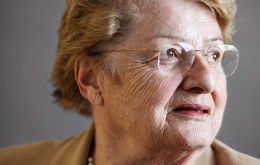
By Anne Krueger (*) - Argentina's President Mauricio Macri knew that he had inherited a sick economy when he took office in 2015, but failed to take his medicine. As a result, the country now has no choice but to face up to a period of painful structural adjustment.
-
Thursday, October 25th 2018 - 06:10 UTC
Riots outside, and insults inside as Argentine Congress discusses austerity budget
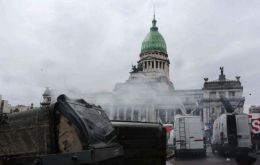
Protesters opposed to proposed austerity measures clashed with police outside Argentina's Congress on Wednesday as lawmakers discussed next year's budget. Dozens of people threw rocks while police in riot gear responded with rubber bullets and water cannons. Local television said that at least twenty-seven people have been detained but there were no confirmed reports on injuries.
-
Tuesday, October 9th 2018 - 21:29 UTC
IMF foresees 2.6% GDP drop for Argentina this year - inflation 40%
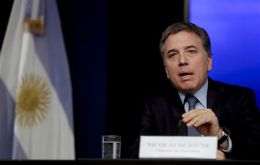
Argentina's GDP will fall 2.6% and inflation will reach 40% this year, according to the International Monetary Fund's Global Perspectives Report released Monday at the beginning of the body's annual Assembly in Bali, Indonesia.
-
Monday, September 3rd 2018 - 09:25 UTC
Argentina's efforts to regain confidence: cutting number of ministries and taxes on farm exports
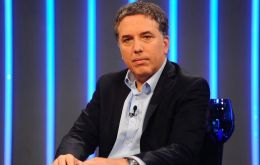
Argentina is drafting plans to cut its budget deficit to convince nervous investors it can pay its debts and this Monday Finance minister Nicolas Dujovne is scheduled to announce measures, before traveling to Washington to meet with IMF's chief Christine Lagarde.
-
Friday, July 20th 2018 - 07:21 UTC
Argentina finances improving: half year primary deficit drops to 0.8% of GDP

Argentina posted a primary fiscal deficit of 105.8 billion pesos (US$3.7 billion), or 0.8% of gross domestic product (GDP) in the first half of 2018, government data showed on Thursday, down 26.7% from the same period last year.
-
Wednesday, February 14th 2018 - 07:10 UTC
The Wall Street Journal: “Inflation stalks Macri in Argentina”

The Wall Street Journal has published a piece on the political situation of Argentine president Mauricio Macri, battling inflation, an undelivered electoral pledge, and allegedly very much aware of a long standing spell: no non Peronist president has been able to complete the mandate for which he was elected.
-
Friday, November 3rd 2017 - 07:52 UTC
EU support: Argentina sells 30-year Euro bond, first time in history
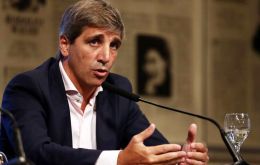
Argentina finalized its foreign bond sale plan for 2017 on Thursday, selling 2.75 billion Euros in three bonds in an offering that was more than four times oversubscribed, the Finance Ministry said in a statement.
-
Tuesday, September 26th 2017 - 13:04 UTC
Argentina's GDP expands 2,7% in second quarter over a year ago
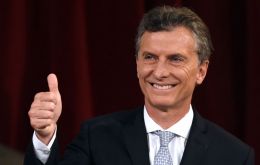
Argentina’s gross domestic product grew 2.7% in the second quarter versus the same period last year and expanded by 0.7% versus the first three months of 2017, the government’s Indec statistics agency said.
-
Friday, September 23rd 2016 - 09:32 UTC
Argentina's economy further contracts in 2Q; government insists recovery is round the corner
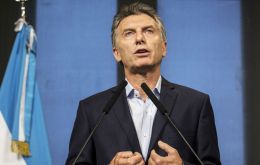
Argentina’s recession deepened in the second quarter as President Mauricio Macri’s efforts to implement free-market reform exacerbated an already flagging economy. GDP fell 3.4% from the same period a year earlier, the largest year-on-year contraction in almost two years, the refurbished statistics agency said in a report published on Thursday.
